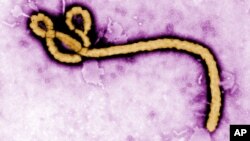The Ebola outbreak in West Africa is still not over. Health officials continue to report cases in Guinea and Sierra Leone. Liberia was declared Ebola-free on May 9.
Dr. Margaret Harris of the World Health Organization said, “It’s taking a little bit longer and it’s proving quite difficult in both Guinea and Sierra Leone. But honestly, this is something we’ve expected. We’ve been saying for a long time - we keep using this analogy - ‘the bumpy road.’ We noticed when Liberia had managed to drop most of its cases down it still took four months before they got to the end of their outbreak. And we’re seeing the same sort of thing…in both Sierra Leone and Guinea.”
She said the outbreak in the two countries is a bit more complex and difficult than in Liberia.
“It is something we really have to intensify our efforts to tackle,” she said.
One major obstacle to ending the epidemic remains a lack of awareness in some places.
“People in communities that are affected by Ebola… and this is not all the people just some people…still do not accept that it really is the risk that we know it is. So, for instance, we’re still seeing traditional herbalists treating people with illness that turns out to be Ebola. We had one such case, which sparked another 20 others cases….and we’re also still seeing unsafe burials,” she said.
Harris does not have exact numbers, but she said, “There are certainly a large number of people who are quarantined in specific areas.”
The hotspots are along the common border between Guinea and Sierra Leone. However, Harris said tests show this is not because the virus is being carried from one country to the other. Most of the infections involve movement within the countries. So, a lot of work needs to be done to learn who came in contact with infected people. It’s called contact tracing.
“We feel that the screening being done at the border is being done appropriately. And that’s something that governments in all three countries have made a great deal of effort to ensure that people who have symptoms do not travel into other areas,” The WHO official said.
As for what still needs to be done, Harris said, “We think we certainly need to really re-intensify. One of the difficulties with an outbreak that’s as long as this is fatigue really sets in. And that sets in at local levels. That sets in at national level and that certainly sets in at international level.”
She said that she’s spoken to many people who think the outbreak is over because there are just a few cases. But she warned just one case can reignite the epidemic.
Harris added that some of the lessons learned about containing Ebola are being applied to the MERS outbreak.





